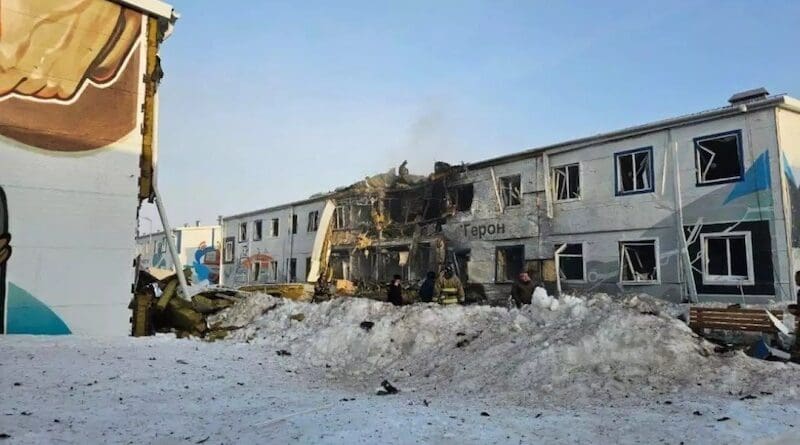Ukrainian Drone Attack On Tatarstan Shows Republics Moscow Cannot Defend Them – Analysis
By Paul Goble
Ukraine’s April 2 drone attack on a refinery in Tatarstan has shocked many in Russia. The strike, which hit a target 1,200 kilometers (800 miles) from the frontlines of the Kremlin’s war, shows that Kyiv can bring the war far deeper into Russia than ever before.
The shock echoing across the country and in the halls of Moscow, however, pales in comparison to the remarkable response of the leadership of the Turkic Muslim republic in the Middle Volga. Rustam Minnikhanov, Tatarstan’s head, said bluntly in the wake of the attack that “each enterprise, each municipality, and each city [of the republic] must solve these problems with our own forces. … No one will defend us besides ourselves” (Kommersant, April 3; Idel.Realii, April 4).
Minnikhanov did not explicitly suggest that Tatarstan was unable to rely on the Russian central government for help. Many Tatars and non-Russians, however, are sure to view the Tatarstan leader’s remarks as a signal that they must immediately take matters into their own hands to defend themselves and, over the long term, ensure their survival. The extent to which they take measures to protect themselves could give a powerful new impetus to nationalists and regionalists across Russia who insist that they and their homelands have no choice but to pursue genuine federalism. If Moscow rejects that, then they will push for outright independence from an imperial center that is no longer able—or perhaps unwilling—to defend them.
The drone attack on Tatarstan may come to resemble the May 1987 flight of Mathias Rust. Rust, a (West) German citizen, piloted a small private plane through Soviet air defenses and landed in Red Square, embarrassing the Soviet leadership and helping precipitate the Soviet Union’s collapse four years later. This action confirmed that the Soviet Union was “a colossus with feet of clay” as many of its citizens suspected and many of its leaders feared. Ruslan Aysin, a Tatar commentator now living in Türkiye, has also pointed to the similarity between Rust’s flight and the recent attack on Tatarstan, and it should be taken seriously (Idel.Realii, April 3). Minnikhanov’s reaction to the Ukrainian drone attack did not come out of nowhere, which makes it even more likely that Aysin’s analogy will hold.
Despite Russian President Vladimir Putin’s efforts to centralize power, over the past several years, he has taken three steps that have allowed and even forced the regions and republics to take greater responsibility for their own fate. First, in 2020 and 2021, Putin repeatedly said that regional officials, not Moscow, bore primary responsibility for deciding how to fight COVID-19. He, of course, did this to avoid having blame fall on him. This action, nevertheless, gave regional leaders a level of agency they had not enjoyed in recent years (Window on Eurasia, July 27, 2021).
Second, the Kremlin leader had his government permit businesses in the regions to set up their own private military companies (PMCs) to defend themselves from foreign or domestic attacks (The Barents Observer, February 9, 2023). Third, to raise troops for his war against Ukraine, Putin has ordered the regions and republics to create units drawn from local military-age men. In the non-Russian republics, these units are primarily monoethnic. Some fear that regional elites will use these units to defend themselves and their territories in the future (Kavkaz Uzel, July 7, 2022; see EDM, July 14, 2022, March 27, April 4, 9; Window on Eurasia, July 31, 2022).
Tatarstan has been affected by all three of these actions from Moscow, and Minnikhanov’s remarks after the Ukrainian drone attack must be read in that context. He and his government had to devote enormous attention to fighting COVID-19, often without much help from Moscow (Kavkazskiye Vedomosti, July 31, 2023). The major corporations of his republic, following Putin’s PMC order a year ago, have been purchasing equipment that will allow them to defend themselves—something they have proudly highlighted after the drone attack (Business Online, April 3). Additionally, Kazan now takes pride in supporting one nominally Russian unit in Ukraine whose men, according to Tatarstan officials, are “90 percent Tatar and 90 percent Muslim” (Official Internet Portal of Self-Government of the City of Kazan, April 8).
Most of these developments have occurred under Moscow’s and the West’s respective radars. Still, they are critical for understanding the Russian political system and Ukraine’s campaign against Kremlin aggression. No one will dispute that the Russian system is hyper-centralized and that Putin is the paramount power in the regions and republics. Tatarstan’s words and actions now suggest that the situation is more complicated. The Kremlin has not centralized everything. It has compelling reasons for the republics and regions to retain some powers, given the complexity of a country as large and diverse as Russia and the need to deflect widespread anger away from Moscow and Putin. The situation in Tatarstan, however, strongly suggests that Putin’s Kremlin does not fully understand the problems it faces and may be sowing its own demise with the policies it has enacted.
Ukraine’s “drone offensive” is exacerbating Putin’s difficulties in this regard. With each passing month of Moscow’s war, Kyiv has devoted increased attention not only to ethnic Ukrainian regions within the Russian Federation but also, more generally, to the non-Russian nations as potential allies against the Kremlin (see EDM, January 18, October 13, 2023, January 25). Through its drone attack on Tatarstan, Kyiv may have achieved more than many might have expected in helping defeat Russia’s aggression. Kazan’s reaction may serve as a guide to Ukrainian strategy in the coming weeks.
This article was published at The Jamestown Foundation’s Eurasia Daily Monitor Volume: 21 Issue: 56

